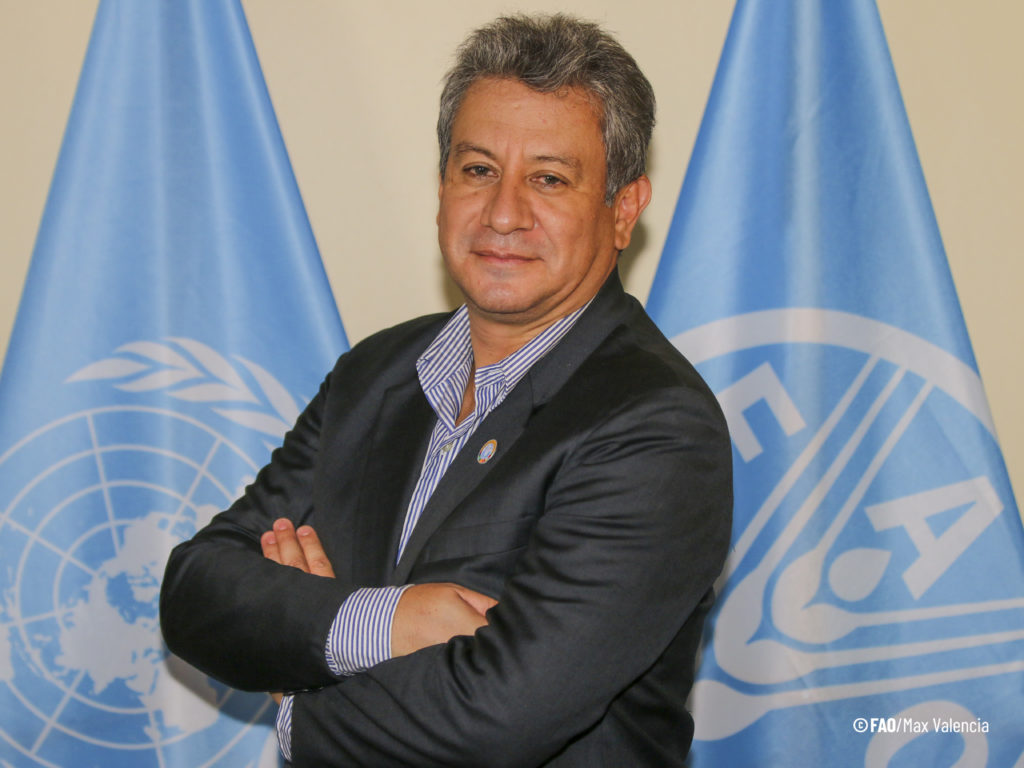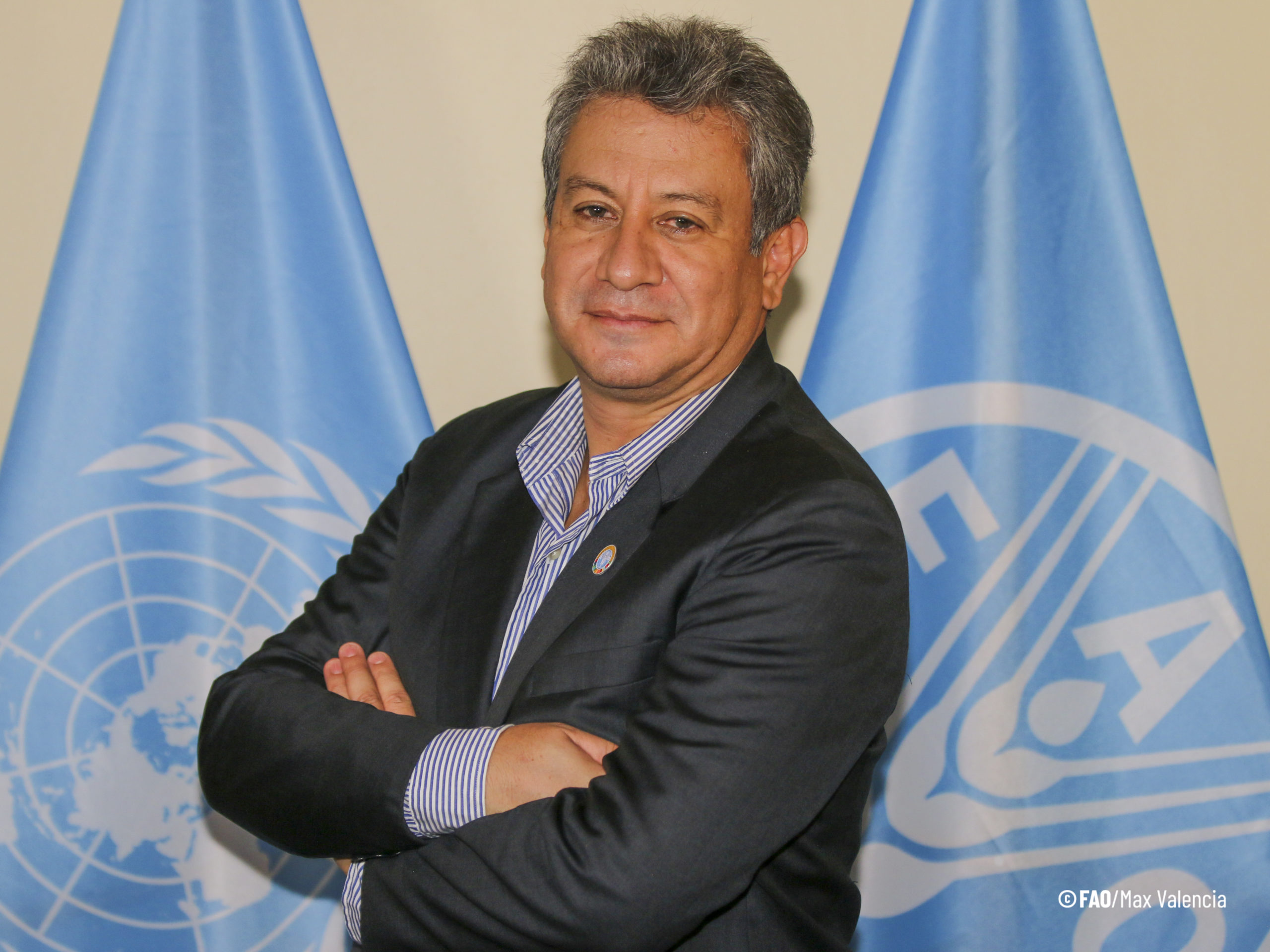Jorge Meza, FAO Representative in Argentina and Uruguay, comments that knowing the experiences of other countries helps to solve problems at the local level and incorporate innovations
Paulo Beraldo
Jorge Meza, Representative of the Food and Agriculture Organization of the United Nations (FAO) in Argentina and Uruguay, considers that the Sustainable School Feeding Network (RAES, for its Spanish acronym) is a fundamental initiative for the region of Latin America and the Caribbean. In an interview with the RAES platform, Meza comments that he hopes that these two countries activate and strengthen their participation in the network and emphasizes that working together is essential for mutual support to strengthen school feeding policies.
“There is a lot of experience in the countries, information and lessons learned about what should be done and also what should not be done with school feeding”, he says. “The solution to the problems faced by some countries has already been achieved in others. In addition, some have incorporated innovations in the way they implement their school feeding programmes”.
In the conversation, Meza addresses the panorama of school feeding in Argentina and Uruguay, and comments on the importance of regulatory frameworks for food and nutritional security, a priority topic on the RAES agenda.

From your institutional point of view, what is the importance of the school feeding policy in the framework of more inclusive and resilient food systems, to achieve the SDGs?
National school feeding policies have multiple benefits. First and foremost, the children will receive a nutritionally adequate diet, and with this, they will be able to develop their academic, intellectual and physical activity more adequately. This is a clear action to include the population that is in the educational system in the food system.
Through nutritionally adequate school meals, it is also hoped that the children will build healthier eating habits, which will later become part of their education and culture, and eventually spread to their own families, gradually improving the eating habits of the entire society.
It is also important to consider that children who are well fed and adequately trained in schools are an important basis for progress. An adequate diet will allow them to develop properly and with good health, as the pressure on the public health system will be smaller. In addition they will have longer productive lives.
From the Brazil-FAO Cooperation, we created the Sustainable School Feeding Network (RAES) to provide and facilitate this regional dialogue, articulating the school feeding policy with other priority themes. In your view, what is the contribution of a network of this nature?
The RAES is a fundamental initiative. There is a lot of experience in the countries, information and lessons learned about what should be done and what should not be done with school feeding. The solution to the problems faced by some countries has already been achieved in other countries. In addition, some countries have incorporated innovations in the way they implement their school feeding programmes.
One of the key elements to improve school feeding in the region is to support the exchange of experiences between the national authorities responsible for the programmes. In this sense, the RAES is essential as a platform for regional exchange and mutual support.
This was confirmed during the pandemic. The Network helped to exchange information about solutions to sustain functional school feeding programmes, even when boys and girls were isolated at home. In some cases, it helped to maintain a minimum diet for students. Currently, the Network continues the exchange, no longer in a context of food emergency, but of social recovery, always focusing on reducing food insecurity and guaranteeing the right to adequate food. We hope that Uruguay and Argentina will activate and strengthen their participation in the RAES Network.
In line with possible collaborations at the regional level, how do you see the possibilities for intervention by RAES in our region, especially together with Uruguay and Argentina? How can the experience of other LAC countries positively influence the SFPs of Argentina and Uruguay?
For Uruguay, the RAES can be an opportunity to learn about experiences from other countries and strengthen the system of decentralized public food purchases for school children and high school students, from local family farmers. On the other hand, Uruguay could contribute through its experience in the implementation of its School Feeding Programme initiated at the beginning of the 20th century. The country has carried out an exercise to assess and monitor the nutritional status of SFP beneficiaries, a practice that may also be important for other countries in the region. There is also experience in schools supplying food to secondary education centres. This is to name a few examples.
The Law on Healthy Eating in Educational Centers also regulates the commercialization and advertising of food in educational environments, because, although the SFP covers a significant population of schoolchildren and adolescents, food and products are sold in educational centers. Likewise, a decree on food labeling regulates the marketing of foods with a high content of sodium, sugar or fat, through the implementation of frontal labeling on the package. This regulation had the support of several United Nations entities in Uruguay, including the FAO.
And what are possible collaborations with Argentina?
Concerning Argentina, FAO considers that school feeding occupies an important place on the national agenda, and therefore supports the State in strengthening food environments and school feeding, as important elements in the strategy to reduce food insecurity and malnutrition. Regarding this matter, in the year 2021, the Law for the Promotion of Healthy Eating No. 27.642 (Frontal Food Labeling Law) was sanctioned in Argentina.
This regulation is very important to safeguard good nutrition for students, as it will help in the process of regulating food advertising to which children are exposed. In addition, it will support the definition of foods that can and cannot be sold in schools.
It is also important to mention that FAO in Argentina leads the United Nations System Working Group on “Food and Nutritional Security”. From this group, the work of UN Agencies, Funds and Programmes is articulated to support Argentina in sanctioning, regulating and implementing the Frontal Labeling Law. The group has carried out communication campaigns aimed at the general public on the subject.
At the moment, Uruguay is promoting a Food and Nutrition Security Law through the Parliamentary Front against Hunger. How do you see the importance of regulatory frameworks for this topic, in terms of establishing governance mechanisms?
Regulatory frameworks are essential to prioritize the topic, adjust the institutional framework and governance mechanisms and facilitate the implementation of concrete actions, budgets and adapt instruments to current challenges in terms of food security. They are also important to support the process of transforming agrifood systems, including school feeding programmes, to strengthen them.
Uruguay has a Special Advisory Commission for the Right to Food, which corresponds to what we call “Parliamentary Fronts against Hunger”. This is a group of senators and deputies that dedicates special attention to this fundamental topic to support cross-party initiatives of national interest on the subject. The Commission receives support from the FAO Programme “Initiative Latin America and the Caribbean Without Hunger”, which has the cooperation of the Government of Spain.
Uruguay has been a major player in the aforementioned Parliamentary Fronts since its creation. Its members are currently working on the challenge of food loss and waste, but they also intend to evaluate a law project on food and nutritional security, whose objective is to order the legislation and institutions related to the human right to adequate food, in a more general way.
There is a consensus that scaling good experiences at national and regional level helps to promote a sustainable and responsible agro-food system. In the case of Uruguay, can the Healthy Environments experience be seen as something that can be promoted at the national level and also shared with the other LAC countries?
No doubt. In addition to theoretical knowledge of what is recommended or not to be done, for young people, experimentation, approaching cooking and healthy eating, are fundamental. A healthy food environment, linked to the availability of nutritious, safe and tasty food, is essential to improve school feeding. The healthy food environment, in the school context, refers to all the infrastructure and circumstances within schools and colleges and their surroundings, in which food is found, purchased or consumed, and the nutritional content of these foods.
The environment, which also includes available information, promotion (advertising, brands, food labels, packaging, promotions, etc.) and the price of food, determines the degree to which food is available, accessible and convenient. A healthy school eating environment allows and encourages the school community (children, school staff, parents or family members) to choose foods compatible with better eating.
Uruguay’s experience, which requires continuous growth at the national level, could be inspiring and adapted to other countries in the region. In 2022, 8 workshops were held in 6 departments in Uruguay, reaching around 240 young people in just one month, which leaves us with an encouraging perspective to continue promoting this experience.



